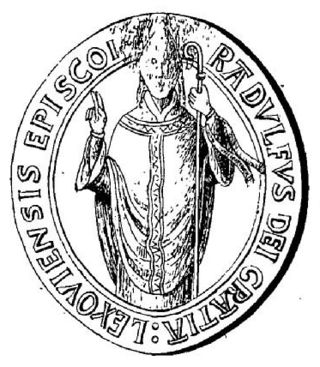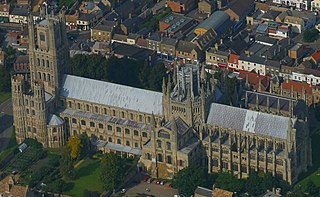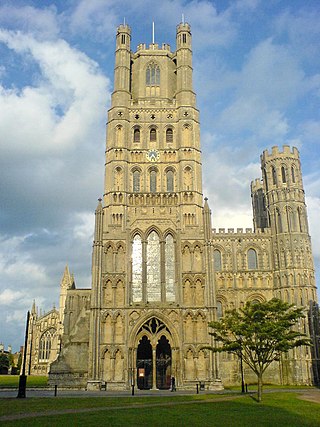Related Research Articles

Year 1112 (MCXII) was a leap year starting on Monday of the Julian calendar.
John de Gray or de Grey was an English prelate who served as Bishop of Norwich, and was elected but unconfirmed Archbishop of Canterbury. He was employed in the service of Prince John even before John became king, for which he was rewarded with a number of ecclesiastical offices, culminating in his pro forma election to Norwich in 1200. De Gray continued in royal service after his elevation to the episcopate, lending the King money and undertaking diplomatic missions on his behalf. In 1205 King John attempted to further reward de Gray with a translation to the archbishopric of Canterbury, but a disputed election process led to de Gray's selection being quashed by Pope Innocent III in 1206.

Walter de Merton was Lord Chancellor of England, Archdeacon of Bath, founder of Merton College, Oxford, and Bishop of Rochester. For the first two years of the reign of Edward I he was - in all but name - Regent of England during the King's absence abroad. He died in 1277 after falling from his horse, and is buried in Rochester Cathedral.
Gerard was Archbishop of York between 1100 and 1108 and Lord Chancellor of England from 1085 until 1092. A Norman, he was a member of the cathedral clergy at Rouen before becoming a royal clerk under King William I of England and subsequently his son King William II Rufus. Gerard was appointed Lord Chancellor by William I, and he continued in that office under Rufus, who rewarded him with the Bishopric of Hereford in 1096. Gerard may have been with the king's hunting party when William II was killed, as he is known to have witnessed the first charter issued by the new king, Henry I of England, within days of William's death.

William Giffard, was the Lord Chancellor of England of William II and Henry I, from 1093 to 1101, and Bishop of Winchester (1100–1129).
Geoffrey Rufus, also called Galfrid Rufus was a medieval Bishop of Durham and Lord Chancellor of England.
Geoffrey Ridel was the nineteenth Lord Chancellor of England, from 1162 to 1173.

Ralph de Warneville was the twentieth Lord Chancellor of England as well as later Bishop of Lisieux in Normandy.
Richard le Gras was Lord Keeper of England and Abbot of Evesham in the 13th century.
Sir John Lexington was a baron and royal official in 13th century England. He has been described as having been Lord Chancellor, but other scholars believe he merely held the royal seals while the office was vacant or the chancellor was abroad. He served two terms, once from 1247 to 1248, and again from 1249 to 1250.
Robert Bloet was Bishop of Lincoln 1093–1123 and Chancellor of England. Born into a noble Norman family, he became a royal clerk under King William I. Under William I's son and successor King William II, Bloet was first named chancellor then appointed to the See of Lincoln. Continuing to serve the king while bishop, Bloet remained a close royal councillor to William II's successor, King Henry I. He did much to embellish Lincoln Cathedral, and gave generously to his cathedral and other religious houses. He educated a number of noblemen, including illegitimate children of Henry I. He also was the patron of the medieval chronicler Henry of Huntingdon, and was an early patron of Gilbert of Sempringham, the founder of the Gilbertine monastic order.

Hervey le Breton was a Breton cleric who became Bishop of Bangor in Wales and later Bishop of Ely in England. Appointed to Bangor by King William II of England, when the Normans were advancing into Wales, Hervey was unable to remain in his diocese when the Welsh began to drive the Normans back from their recent conquests. Hervey's behaviour towards the Welsh seems to have contributed to his expulsion from his see. Although the new king, Henry I wished to translate Hervey to the see of Lisieux in Normandy, it was unsuccessful.

The Bishop of Winchester is the diocesan bishop of the Diocese of Winchester in the Church of England. The bishop's seat (cathedra) is at Winchester Cathedral in Hampshire. The Bishop of Winchester has always held ex officio the office of Prelate of the Most Noble Order of the Garter since its foundation in 1348, and Bishops of Winchester often held the positions of Lord Treasurer and Lord Chancellor ex officio. During the Middle Ages, it was one of the wealthiest English sees, and its bishops have included a number of politically prominent Englishmen, notably the 9th century Saint Swithun and medieval magnates including William of Wykeham and Henry of Blois.

Nigel was an Anglo-Norman Bishop of Ely. He came from an ecclesiastical family; his uncle Roger of Salisbury was a bishop and government minister for King Henry I, and other relatives also held offices in the English Church and government. Nigel owed his advancement to his uncle, as did Nigel's probable brother Alexander, who like Nigel was advanced to episcopal status. Nigel was educated on the continent before becoming a royal administrator. He served as Treasurer of England under King Henry, before being appointed to the see, or bishopric, of Ely in 1133. His tenure was marked by conflicts with the monks of his cathedral chapter, who believed that Nigel kept income for himself that should properly have gone to them.
Osbern FitzOsbern was a Norman churchman. He was a relative of King Edward the Confessor as well as being a royal chaplain. During Edward's reign he received the church at Bosham, near Chichester. He was one of those present at the consecration of Westminster Abbey at Christmas 1065. He was a steward for King William I of England during his reign, as well as being a friend of the king. The story that he became William's chancellor is based entirely on a charter that modern historians have declared mostly spurious. He became Bishop of Exeter in 1072, and was consecrated at St. Paul's in London on 27 May 1072 by the Archbishop of Canterbury, Lanfranc.
William Warelwast was a medieval Norman cleric and Bishop of Exeter in England. Warelwast was a native of Normandy, but little is known about his background before 1087, when he appears as a royal clerk for King William II. Most of his royal service to William was as a diplomatic envoy, as he was heavily involved in the king's dispute with Anselm, the Archbishop of Canterbury, which constituted the English theatre of the Investiture Controversy. He went several times to Rome as an emissary to the papacy on business related to Anselm, one of whose supporters, the medieval chronicler Eadmer, alleged that Warelwast bribed the pope and the papal officials to secure favourable outcomes for King William.
Reynelm was a medieval Bishop of Hereford.
Events from the 1100s in England.
David FitzGerald was a medieval Bishop of St David's in Wales.
Helinand was the bishop of Laon from 1052 to 1098.
References
- Davis, H. W. C., "Waldric, the Chancellor of Henry I" The English Historical Review Vol. 26, No. 101 (January 1911), pp. 84-89
- Powicke, F. Maurice and E. B. Fryde Handbook of British Chronology 2nd. ed. London:Royal Historical Society 1961